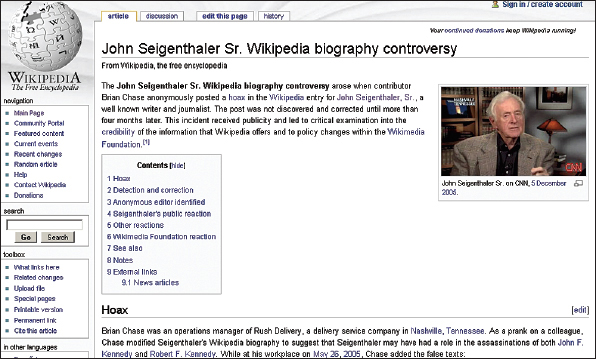Printed Page 427
MEDIA LITERACY
Case Study
A False Wikipedia “Biography”
By John Seigenthaler

“John Seigenthaler Sr. was the assistant to Attorney General Robert Kennedy in the early 1960’s. For a brief time, he was thought to have been directly involved in the Kennedy assassinations of both John, and his brother, Bobby. Nothing was ever proven.”
–Wikipedia
This is a highly personal story about Internet character assassination. It could be your story. I have no idea whose sick mind conceived the false, malicious “biography” that appeared under my name for 132 days on Wikipedia, the popular, online, free encyclopedia whose authors are unknown and virtually untraceable.
At age 78, I thought I was beyond surprise or hurt at anything negative said about me. I was wrong. One sentence in the biography was true. I was Robert Kennedy’s administrative assistant in the early 1960s.
At my request, executives of the website now have removed the false content about me. I phoned Jimmy Wales, Wikipedia’s founder, and asked, “Do you . . . have any way to know who wrote that?”
“No, we don’t,” he said. Naturally, I want to unmask my “biographer.” But searching cyberspace for the identity of people who post spurious information can be frustrating. I traced the registered IP (Internet Protocol) number of my “biographer” to a customer of BellSouth Internet and left two e-mails with the company’s “Abuse Team.”
After three weeks, hearing nothing further about the Abuse Team investigation, I phoned BellSouth’s Atlanta corporate headquarters, which led to conversations between my lawyer and BellSouth’s counsel. My only remote chance of getting the name, I learned, was to file a “John or Jane Doe” lawsuit against my “biographer.” Major communications Internet companies are bound by federal privacy laws that protect the identity of their customers, even those who defame online. Only if a lawsuit resulted in a court subpoena would BellSouth give up the name.
Federal law also protects online corporations—BellSouth, AOL, MCI, Wikipedia, etc.—from libel lawsuits. Under the Communications Decency Act, passed in 1996—and unlike print and broadcast companies—online service providers cannot be sued for disseminating defamatory attacks on citizens posted by others.
Wikipedia’s Web site acknowledges that it is not responsible for inaccurate information, but Wales, in a C-Span interview with Brian Lamb, insisted that his website is accountable and that his community of thousands of volunteer editors (he said he has only one paid employee) corrects mistakes within minutes.
My experience refutes that. My “biography” was posted May 26 [2005]. For four months, Wikipedia depicted me as a suspected assassin before Wales erased it from his website’s history Oct. 5. And so we live in a universe of new media with phenomenal opportunities for worldwide communications and research—but populated by volunteer vandals with poison-pen intellects. Congress has enabled them and protects them.
Note: In 2006 Seigenthaler, with the help of some intrepid reporters, tracked down the man who posted the libelous content. Seigenthaler, however, chose not to sue him, deciding instead to speak out about the experience and to call on Wikipedia to require those who post entries to sign their names and take responsibility for their work. The controversy is now a part of his online Wikipedia bio and also has its own entry (pictured).
Source: Excerpted from John Seigenthaler, “A False Wikipedia ‘Biography,’” USA Today, November 30, 2005, p. 11A.
APPLYING THE CRITICAL PROCESS
DESCRIPTION Go to Wikipedia and look up entries for three topics with which you are familiar. (For example, they could be entries on movies, a musical act, or your hometown.)
ANALYSIS Look for patterns: Are the entries accurate, with sufficient footnoted sources for verification? Is there significant information missing from the entries? When was the entry last updated (see the bottom of the entry page)? Is there an active debate about the topic?
INTERPRETATION What makes a good Wikipedia entry? Why might some topics receive more editing attention than others?
EVALUATION Is the mostly open editing process of Wikipedia a good thing or a bad thing?
ENGAGEMENT Become a registered user of Wikipedia and correct or update a Wikipedia entry yourself.